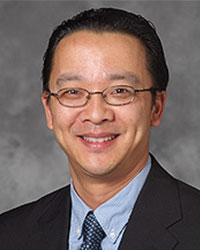

 of Pharmacology
of PharmacologyE-mail: austin_guo@nymc.edu
Tel: 914-594-4625/4720
Mail:
Department of Pharmacology
Basic Science Building, Rm. 546A/B
15 Dana Road
Valhalla, NY 10595
Research interests
My research interests have always been centered on understanding pathological angiogenesis. Currently, my lab is focused on studying the role of Cytochrome P450-derived eicosanoids, specifically 20-hydroxyeicosatetraenoic acid (20-HETE), in the regulation of angiogenesis. Abnormal neovascularization is associated with many serious human diseases, i.e., ischemia and cancer. Recent developments in stem cell biology suggest that circulating endothelial precursor cells (EPC) contribute to postnatal neovascularization, which is an important adaptation for recovery from critical ischemia. Since EPC-induced neovascularization appears essential for repair of ischemic tissue, it is crucial that we understand the factors that regulate EPC involvement in the neovascularization process. We have shown that the CYP4A/20-HETE axis regulates EPC angiogenic functions such as proliferation, migration, and angiogenic gene expression. 20-HETE level is markedly upregulated in ischemic tissue. Moreover, inhibition of 20-HETE synthesis or antagonizing 20-HETE actions decreases ischemia-induced compensatory neovascularization in vivo. EPC and EC are two essential components of the Ischemia-induced neovascularization. Thus, the CYP4A-20-HETE system may be a key to the regulation of the vasculogenic and homing functions of EPC as well as the angiogenic functions of EC in response to ischemia. Stemming from our studies in the role of the CYP4A -20-HETE axis in regulation of angiogenic processes, we are also interested in the regulation of cancer growth by the CYP4A/F-20-HETE system, potentially via an EPC-dependent mechanism involving tumor-mediated angiogenesis. Pharmacological inhibitors of 20-HETE synthases and 20-HETE antagonists have been shown to decrease the growth of some cancers both in vitro and in vivo, suggesting the CYP4A-20-HETE axis may be a novel target for treating some cancers.
Recent Relevant Publications: